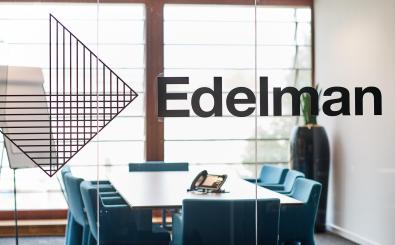Key results
Trust in decline: German institutions caught in a downward spiral of distrust and inaction
Almost two years after the global crisis was declared, the balance sheet is clear: the leap of faith that the government in particular received at the beginning of the pandemic, catapulting it to an all-time high, has been lost. But it is not only the government that finds itself in a vicious circle of mistrust, Germans' trust in the institutions of government, media, business and NGOs is back to pre-pandemic levels, putting them all in the distrust zone.
22 YEARS Edelman Trust Barometer
33,000+ Respondents
28 Markets
Trust bubble bursts
When looking at the general population, Germany has lost an amount of trust compared to the previous year (from 53 index points to 46 index points) and slips into the distrust range (trust score below 50). The top spot as the most trustworthy institution in Germany is no longer held by the government, which has suffered a significant loss of trust (47%, - 12%pts. compared with 2021; global: 52%; -1%pts.). Just ahead of government is business with 48% (- 6%pts. compared with 2021; global: 61%). The media (47 %, - 5 %pts; global: 50 %, - 1 %pts.) is on a par with the government, followed by NGOs (40 %, - 6 %pts. compared with 2021; global: 59 %, + 2 %pts.).
Discussion culture put to the test
The factors influencing the loss of trust are evident in the case of government and media: instead of being unifying forces (government: 34%; media: 36%; globally: 36%, 35%), both are seen as divisive forces (government: 46%; media: 41%; globally: 48%, 46%) in society. Add to that another questionable trend: 64% of those surveyed in Germany say that people in this country lack the ability to have constructive and civil debate on issues they disagree on.
Leadership crisis spreading
One issue that is also alarming in this context is that those surveyed in this country are increasingly concerned that society's leaders in business (45%; globally: 63%), media (45%; globally: 67%) and government (42%; globally: 66%) are purposely trying to mislead people by saying things they know are false or grossly exaggerated. Overall, the trust in these people, CEOs (36%; globally: 49%), government leaders (36%; globally: 42%) and journalists (41%; globally: 46%), as leaders is negative – all remain in the distrust range. Scientists, on the other hand, are trusted (69%; globally: 75%).
Businesses and employers hold out hope
In Germany, an employer's communication is perceived to be the most believable source of information. 49% need to see information from their employer only once or twice to believe it (globally: 52%). 25% automatically assume it is true, if they see the information (global: 13%). CEOs are expected to help shape and influence conversations and policy debates on a range of issues. 70% or more in this country and globally believe CEOs should inform and help shape conversations on topics specifically related to the economy, such as jobs and wage inequality. But the majority also want CEOs to inform and shape conservations and policy debates on societal challenges such as technology and automation, and climate change.
Click here to go to the global TRUST 2022 Website.
About 2022 Edelman Trust Barometer
The 2022 Edelman Trust Barometer is the firm’s 22nd annual trust and credibility survey. The survey was powered by research firm Edelman Data & Intelligence (DxI) and consisted of 30-minute online interviews conducted between November 1 and November 24, 2021. The 2022 Edelman Trust Barometer online survey sampled more than 36,000 respondents, which includes 1,150 general population respondents across 28 markets. For more information, visit https://www.edelman.com/trust/trust-barometer
Press contact
Anna-Lena Schildt, Senior PR & Marketing manager of Edelman Germany
Tel.: +49 (0) 40 80 90 36 770 ; E-Mail: Presse-DE@edelman.com
If you are interested in knowing more about Edelman Trust Barometer 2022, please contact us:

